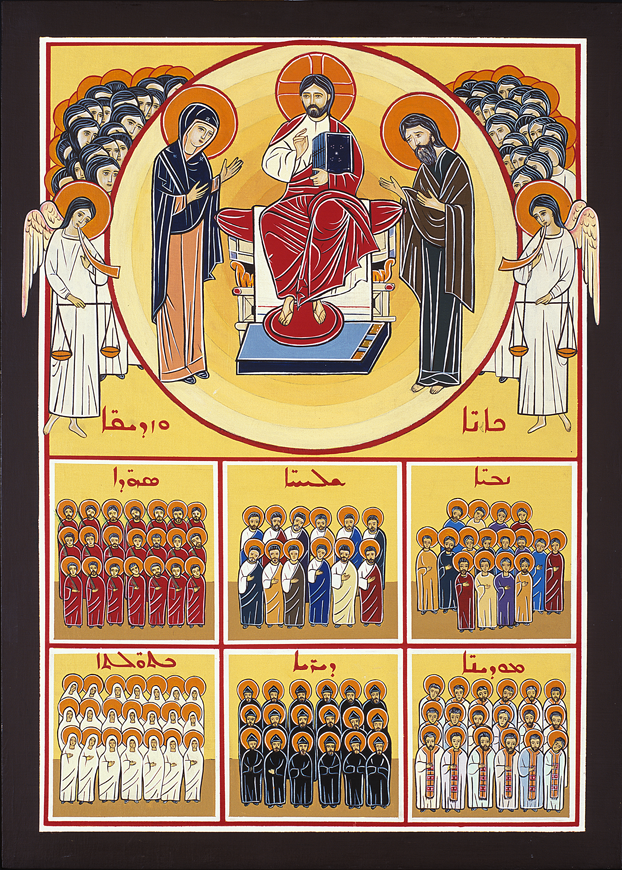
Author: Salwa Elias
This Sunday marks the second week of the three weeks of “Commemoration,” when the Maronite Liturgy celebrates Sunday of the Righteous and Just, who have preceded us to the Heavenly Kingdom of their eternal reward.
Their names may be known or unknown, but they now stand praising and glorifying the One who is the Alpha and the Omega.
Their holiness and the road they travelled to heaven distinguishes these glorious souls from the souls suffering and the souls militant in our communion of saints.
It is only fitting that the opening hymn of the liturgy (Qorbono) on Sunday of the Righteous and Just, addressed to Our Lady, states: “all the children of the church will cry out with hymns of praise and join you in paradise … At the right hand of your son the elect will sing his praise, and they will rejoice.”
Then, in the opening prayer, it follows: “Holy Father, you reward the righteous and the just for their true faith and their profession of that faith. You clothe their bodies with glory and their souls with light.”
According to the Syriac teaching, when Adam and Eve were in the Garden of Eden, they were surrounded by light; in other words, clothed in glory.
But when they sinned they lost the shining robe, only to discover their nakedness.
This explains why in baptism, in the Syriac churches (including the Maronite Church), the priest speaks about bringing back the garment of light which Adam had discarded.
The priest also prays that when the baptised person dies, Christ himself will be the robe of light in which he will be taken to Heaven.
The glorious clothing which had once been ours is restored, but internally. It is appropriate that the Divine Liturgy of the day therefore uses an imagery of light.
For example, in the Hoosoye, is said of the righteous and the just: “They were like lamps of knowledge and holiness, giving light to those who walk the path of life.”
The importance of light as a spiritual theme can hardly be overstated: it is the theme of the first letter of St John, who taught that “God is light” (1 Jn 1:5, cf Jn 1:9).
Anyone who has lost a loved one immediately turns to prayer for consolation.
Then having also wept, and felt the anguish, pain and distress of loss, we pray that grieving families will find their consolation in offering the Qorbono for their souls, as we celebrate our Liturgy for the Righteous and the Just who will in turn pray and intercede for us.
Tragedies around the world have made us more aware of the plight of so many families.
The struggles and heartaches endured by victims of war, poverty, fire, drought, floods, oppression, famine, and homelessness that go unseen by so many.
What about the distressing situations behind closed doors, hidden in the dark nights of loneliness, addictions, or abandonment?
Isn’t it sad that we tend to contemplate eternity when struck with the reality of our human losses, rather than living each day in preparation for, and in the hope of, eternal life with God?
In celebrating the Righteous and the Just, our Liturgy reminds us that we must persevere in seeking our own salvation.
Christ has already redeemed us, now it’s up to each individual to desire and strive for a place among the saints.
Being a Christian in today’s world means being radical, and that’s what I’ve learned from following Christ—to be radical.
It’s not enough for me to “learn” about God, for I must “know” my God in order to follow him and to better guide those placed under my care.
We must trust in the Triune God, stand up for what is right and just, defend the defenceless and speak out for the voiceless, be a light in the darkness for those who are too ashamed or frightened to cry out for help—the homeless and hungry, the abandoned, oppressed, abused, and rejected.
It takes courage to do what is right and just in the eyes of God without appearing to be fanatical in the eyes of the world, but this is what it would take to inherit the promised Kingdom.
Hearts filled with love for God and neighbour, merciful and fair, growing in heroic virtues, must certainly be worthy to merit such a great inheritance from such a loving and merciful Father.
The Maronite Liturgy in these three weeks of Commemoration are a good reminder of our purpose in this life and our destination in the next.
May the Lord grant us a place among the Righteous and Just, in his mercy we pray.
Salwa Elias is a member of the Maronite Catholic Church and is the EWTN producer for Australia and New Zealand


